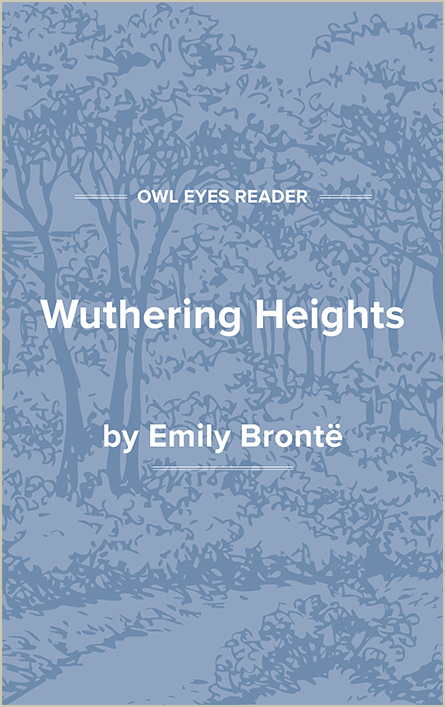Vocabulary in Wuthering Heights
Vocabulary Examples in Wuthering Heights:
Chapter I
🔒
5
"Wuthering..."
See in text (Chapter I)
Wuthering in the dialect of Yorkshire is a derivative of the Scots word for whithering , defined as the rushing and blustering of wind and the noise it makes.
Stephen Holliday
Subscribe to unlock »
"go to the deuce..."
See in text (Chapter I)
The phrase “go to the deuce" is an obscene way for someone to tell another to “go to the devil."
Owl Eyes Reader
Subscribe to unlock »
"gaiters..."
See in text (Chapter I)
The word "gaiters" refers to the leather leg coverings that reach either above the ankle or to the middle of the calf.
Owl Eyes Reader
Subscribe to unlock »
"griffins..."
See in text (Chapter I)
The word "griffins" refers to mythical creatures with the body and legs of a lion and the head, wings, and talons of an eagle.
Owl Eyes Reader
Subscribe to unlock »
"grotesque..."
See in text (Chapter I)
The word "grotesque" refers to a style of art that is characterized by the mixing of monstrous animal figures with human characteristics. This style distorts the natural into a caricature of morbidity and ugliness.
Owl Eyes Reader
Subscribe to unlock »
Chapter II
🔒
5
"matronly..."
See in text (Chapter II)
The word "matronly" refers to a woman who is well-respected, dignified, and holds social distinction.
Owl Eyes Reader
Subscribe to unlock »
"amiable..."
See in text (Chapter II)
The adjective "amiable" means friendly. However, in this context, the word is used sarcastically.
Owl Eyes Reader
Subscribe to unlock »
"hallooed..."
See in text (Chapter II)
The verb "to halloo" or "to holler" means to shout or cry out to grab someone's attention.
Owl Eyes Reader
Subscribe to unlock »
"coal-scuttles..."
See in text (Chapter II)
The word "coal-scuttles" refers to containers placed beside an indoor coal-fired stove to easily pour coals onto a fire.
Owl Eyes Reader
Subscribe to unlock »
Chapter III
🔒
9
"hieroglyphics..."
See in text (Chapter III)
The word "hieroglyphics" refers to a written system that employs pictorial characters and is often difficult to decipher.
Owl Eyes Reader
Subscribe to unlock »
"homily..."
See in text (Chapter III)
The word "homily" refers to a short religious sermon that explains how individuals ought to behave.
Owl Eyes Reader
Subscribe to unlock »
"vagabond..."
See in text (Chapter III)
The word "vagabond" refers to a a vagrant or wanderer who travels from one place to another without a fixed home.
Owl Eyes Reader
Subscribe to unlock »
"Brethren..."
See in text (Chapter III)
The word "brethren," which is plural for brother, is often used when referring to members of a congregation.
Owl Eyes Reader
Subscribe to unlock »
"lattice..."
See in text (Chapter III)
The word "lattice" refers to a framework of wood and metal strips that covers a pane of glass.
Owl Eyes Reader
Subscribe to unlock »
"changeling..."
See in text (Chapter III)
The word "changeling" refers to a child who secretly replaces another during infancy.
Owl Eyes Reader
Subscribe to unlock »
Chapter IV
🔒
4
"WEATHER-COCKS..."
See in text (Chapter IV)
The word "weathercocks" has two definitions: first, it describes the vanes mounted on roofs that demonstrate the wind's direction; second, it describes an individual who is very changeable. Here, the text refers to the latter definition.
Owl Eyes Reader
Subscribe to unlock »
"unfledged..."
See in text (Chapter IV)
The word "unfledged" refers to someone who is immature, as someone without enough feathers to fly.
Owl Eyes Reader
Subscribe to unlock »
"the three kingdoms..."
See in text (Chapter IV)
The phrase "the three kingdoms" refers to England, Scotland, and Ireland, before the United Kingdom was created.
Owl Eyes Reader
Subscribe to unlock »
Chapter V
🔒
1
"Pharisee..."
See in text (Chapter V)
In today's usage, the word "Pharisee" is a derogatory term for someone is seen as self-righteous or hypocritical. Originally, a Pharisee was someone who belonged to a Jewish sect and who strictly observed traditions of Hebrew law.
Owl Eyes Reader
Subscribe to unlock »
Chapter XXXIV
🔒
3
"fender..."
See in text (Chapter XXXIV)
Here, the word "fender" refers to a screen or metal frame placed before an open fireplace to prevent hot coals from falling out.
Owl Eyes Reader
Subscribe to unlock »
"Titan..."
See in text (Chapter XXXIV)
According to ancient Greek mythology, Titans were the predecessors of the Greek gods. In contemporary usage, the word "titan" refers to someone who is very powerful or large in stature.
Owl Eyes Reader
Subscribe to unlock »
"harebells..."
See in text (Chapter XXXIV)
The word "harebells" refers to a type of plant with purple bell-shaped flowers.
Owl Eyes Reader
Subscribe to unlock »

